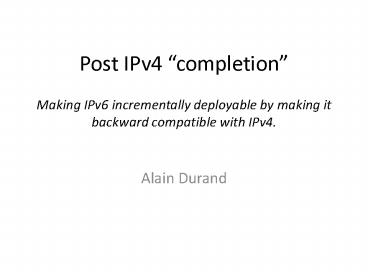Post IPv4 - PowerPoint PPT Presentation
Title:
Post IPv4
Description:
Comcast As the largest cable operator in ... self-regulatory governance model is a significant factor in the success of ... Comcast IPv6 deployment Two phase ... – PowerPoint PPT presentation
Number of Views:96
Avg rating:3.0/5.0
Title: Post IPv4
1
Post IPv4 completion Making IPv6
incrementally deployable by making it backward
compatible with IPv4.
- Alain Durand
2
Comcast
- As the largest cable operator in the United
States, Comcast manages a large pool of IPv4
resources and is an active and responsible member
of the Internet community. - We have been working within community-defined
policies, maintaining effective utilization of
resources. - Comcast fully supports the community based,
bottom-up, governance model of policy development
to oversee those resources. - The Internets private-sector, self-regulatory
governance model is a significant factor in the
success of the whole Internet industry. - This model has proven responsive enough to meet
the demands of a fast growing global industry.
3
Comcast IPv6 deployment
- Two phase approach
- 1) Infrastructures, Cable Modem management
- Done and/or in trial
- 2) Connection to the home
- Planning lab trials
- Lessons learned
- Early planning reduce cost
- Networking is rather straightforward, code is
mostly there - Software can be difficult to get from vendors
- 3rd party services are mostly non existent
4
IANA IPv4 completion is in front of us
IPv4 will not stop working!
Uncertainty
- Completion of IPv4 resources will not be
uniform - Large contiguous allocation requests might be
denied by an RIR when fractioned space is still
available. - Small IPv4 allocation requests might be granted
by an RIR long after completion of the IANA free
pool.
5
A broadband ISP must supportcontinued,
un-interrupted growth regardless of IPv4
addressavailability
- DISCLAIMERComcast has not made any decisions
to deploy any of the following technologies.
6
Post IPv4 completion
- IPv4 resources alone will not provide a viable
supply to the industry for the long term. - The Internet edges will still be mostly IPv4
- Many hosts in the home (Win 9.x, XP,) are
IPv4-only. - They will not function in an IPv6 only
environment. - Few of those hosts will upgrade to Windows
Vista. - Content servers (web, Mail,) hosted on the
Internet by many different parties will take time
to upgrade to support IPv6.
7
Provisioning color code
IPv4-only dual stack provisioned dual stack, IPv6-only provisioned
device
link
router
network
devices with pure IPv6-only code are out of
scope
8
Plan zero dual-stack
After IPv4 IANA completion, there will not be
enough IPv4 addresses to sustain this model.
Internet
Internet
ISP
legacy customer global v4 address home
gateway NAT v4-gtv4
IPv4IPv6 home gateway
IPv4IPv6home gateway
Today such deployments do not see much IPv6
traffic, mainly because there is little content
reachable with IPv6.
192.168/16
192.168/16
192.168/16
9
Plan A dual-stack corenew customers are
provisionedwith IPv6-only but no IPv4 support
lots of broken paths
Internet
ISP
- impact on new customers
- legacy IPv4 devices cant get out of the home.
- new IPv6 devices cant get to the IPv4
Internet.
legacy customer global v4 address home
gateway NAT v4-gtv4
IPv6 provisionedhome gateway
IPv6 provisionedhome gateway
192.168/16
192.168/16
192.168/16
10
Plan B double NATnew customers are
provisionedwith overlays of RFC1918
- two layers of NAT
- no evolution to IPv6
- network gets increasingly complex to operate.
- Intersections of Net 10 overlays are prone to
failures.
Internet
ISP
Carrier grade NAT
carrier-grade NAT
Net 10
Net 10
complex internal routing(source based?) to
handleboth legacy RFC1918customers on the
sameaccess router
legacy customer global v4 address home
gateway NAT v4-gtv4
private v4 address home gateway NAT v4-gtv4
private v4 address home gateway NAT v4-gtv4
192.168/16
192.168/16
192.168/16
11
Plan C dual-stack litenew customers are
provisionedwith IPv6-only IPv4 support
- simplifies network operation- provides an
upgrade path to IPv6
Internet
ISP
Carrier grade NAT
carrier-grade NAT
carrier-grade NAT
Internet
legacy customer IPv4 provisioned home gateway NAT
v4-gtv4
IPv6 provisionedhome gateway
IPv6 provisionedhome gateway
Dual-stack lite provides IPv4support using
an IPv4/IPv6 tunnelto a IPv4/IPv4 NAT.
192.168/16
192.168/16
192.168/16
12
Plan C New stand-alone devices are
provisionedwith IPv6-only IPv4 support with
dual-stack lite
Internet
ISP
Internet
carrier-grade NAT
Dual-stack lite client dual stack
device IPv6-only provisioned no IPv4 address
Stand-alone, dual-stack, IPv6-only provisioned
devicescan use dual-stack lite to reach the IPv4
Internet.
13
Dual-stack lite makes IPv6 incrementally
deployable































